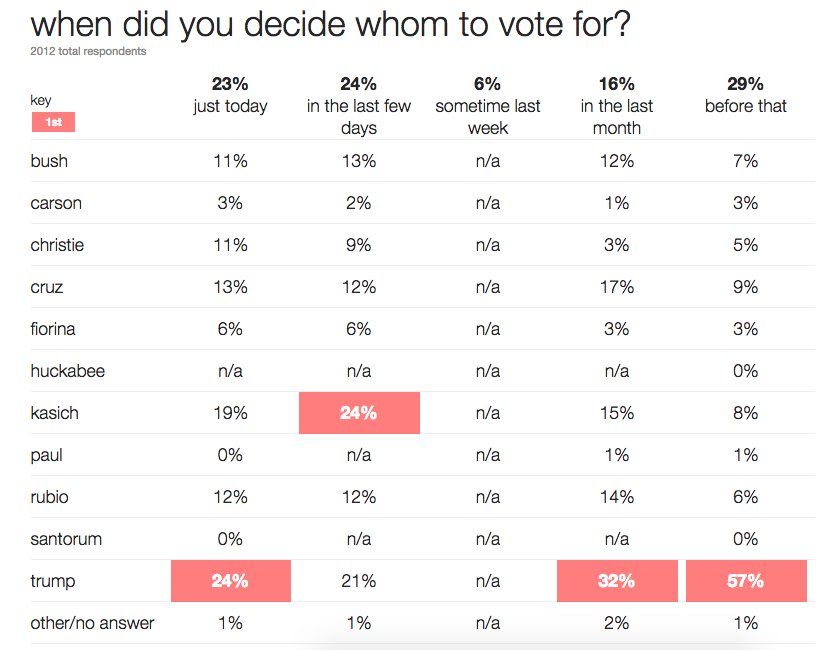Pollsters Get Lucky in New Hampshire
More than half of GOP voters in the state say they made up their minds within the last week.

America's pollsters can breathe a sigh of relief: The outcome of last night's New Hampshire primary largely mirrored the trend their polls had been finding in the state. Donald Trump won big, while the remaining support was badly splintered among the four main "establishment lane" candidates in John Kasich, Marco Rubio, Jeb Bush, and Ted Cruz.
But make no mistake: This salutary result from a survey researcher's perspective was mostly a matter of good luck.
The big problem with horse-race pulse taking, especially during primary season, is found in the very form of the question being asked: If the election were held today, for whom would you vote? But of course, polls are taken days, weeks, and months before people actually cast their ballots.
As any honest survey researcher will tell you, polls are not supposed to be predictive, though we've collectively come to treat them like they are. The best a poll can do is to accurately measure attitudes right now. But even a methodologically flawless survey that perfectly captures current voter sentiment runs the substantial risk that people could change their minds before Election Day.
That's exactly what went wrong in Iowa last week. Trump had been enjoying a solid advantage in the polls. But as the cliché goes, the only poll that truly matters is the one that happens at the ballot box, and among those who made up their minds at the last second regarding who they would support, more than 85 percent went for someone other than the real-estate mogul. That late shift (paired with the fact that an estimated 80,000 people turned out to caucus for the first time this year) proved to be enough to erase his lead completely.
Interestingly, more than half of New Hampshire Republicans also waited until the final days to decide who they'd support, according to the exits. But unlike in Iowa, where people broke away from how they had been telling interviewers they were planning to vote, here they came down in proportions closer to what pollsters had been gauging.

The pre-election RealClearPolitics average had Trump getting about 31 percent of the vote. Among those who made up their minds "just today" or withing "the last few days," 24 percent and 21 percent respectively went to Trump. In other words, yes, last-minute deciders fell off somewhat from the frontrunner, but not at nearly the same level they had in the Hawkeye State. Meanwhile, Kasich overperformed among late-breakers, boosting him unexpectedly (but not exactly shockingly) into second.
One lesson is this: The last few days of a campaign can matter quite a lot, as they did in Iowa, where Trump made the fatal mistake of "snubbing" voters by skipping the last debate. Had things played out otherwise this week in New Hampshire, we could be looking at a totally different set of results. But it's only in hindsight that you can really discern whether the polls in a state are wrong or right.


Show Comments (26)